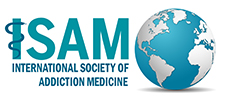ISAM GUIDELINES FOR ACCEPTING DONATIONS
SCOPE...
SCOPE: These guidelines apply to all donations between companies, foundations or individuals and the International Society of Addiction Medicine (ISAM)
The term ‘partnership’ encompasses all relationships between the ISAM and a company or foundation, in which the ISAM grants the partner the possibility of using its name, emblem/logo or image in its communication and promotional materials, thereby potentially creating a public association of image between the company and the ISAM
The term “Companies” encompasses private firms and their foundations, as well as state-owned enterprises.
KEY CRITERIA AND METRICS...
KEY CRITERIA & METRICS
The following section clarifies which of these are exclusionary, cautionary, and positive criteria. In the case of corporate partnerships, it is important to note that these criteria are used to assess the risks that stem from a company’s reputation and business practices but not the risks or benefits that may be specific to a partnership between the ISAM and a given company. Therefore, an assessment of these criteria serves as the basis for screening all potential private donors, whether they be companies, foundations or individuals, but is also complemented with an assessment of partnership risks and benefits in the case of potential corporate partners.
Exclusionary Criteria
An exclusionary criterion is one that automatically prevents ISAM from accepting any form of support from a company, foundation or individual. These pertain to activities that present a reputational risk for the ISAM and for which clear thresholds can be identified and objectively measured. The exclusionary criteria establish thresholds with regards to the degree of involvement in:
- The manufacture or sale of arms, including any direct or indirect involvement in the manufacture or sale of illegal or controversial weapons;
- International crimes; this encompasses International crimes as defined in treaty and customary law, which include serious violations of International Humanitarian Law (IHL) and gross violations of International Human Rights Law (IHRL), such as crimes against humanity, genocide, torture; as well as other international crimes such as piracy, transnational organized crime, human trafficking, financing of terrorism, amongst others;
- The manufacture of products that are widely recognized as deleterious to health such as alcohol and nicotine
- Socially sensitive industries, including gambling and pornography.
The exclusionary criteria are supplemented by a list of cautionary criteria and positive criteria, detailed below, which further influence the decision to accept support from a potential donor or partner.
Cautionary Criteria
Beyond the exclusionary criteria outlined above, which categorically prevent the ISAM from receiving support from a company, foundation or individual, the decision of whether to accept support from a company will generally require weighing the potential benefits against potential risks. Cautionary criteria flag issues that may present potential risks, keeping in mind that some of these risks may be mitigated. Cautionary criteria are often more qualitative in nature, and therefore do not allow for clear thresholds. The cautionary criteria cover where a company:
- Has been involved in past controversies;
- Is potentially exposed to future controversies;
- Does not respect internationally recognized human rights and fundamental labour standards;
- Has engaged knowingly in practices running counter to the rules and principles of international humanitarian & human rights law;
- Does not respect materially the local or national laws and regulations of the countries where it operates;
- Through its business practices, materially contributes to armed conflicts or natural disasters.
- Some pharmaceutical companies
Positive Criteria
Whereas cautionary criteria are meant to flag potential risks and issues of concern with potential corporate partners, positive criteria focus on issues that may reflect more positively on company’s reputation and future business behaviour. This includes
- Is a leader in health and wellbeing through policy and practice;
- Would respond positively to input from partners aimed at improving their business practices in a way that promotes social responsibility;
- Promotes the education, health and social welfare of their employees to an extent that goes beyond what the law requires;
- Have a positive image, good reputation and a track record of good ethical behaviour.
DECISION MAKING...
DECISION MAKING
Decisions are taken after thorough examination of such proposed donations. They may also be referred to the ISAM Executive Committee for further examination and subsequently to the ISAM Board of Directors for a final decision.
A Strengths, Weaknesses, Opportunities and Threats (SWOT) analysis will support above ISAM committee members with finalising their decisions
- STRENGTHS: attributes of the partner, project or activity that will help to achieve the objective or improve the outcome.
- WEAKNESSES: attributes of the partner, project or activity that might cause problems, be harmful to the quality of the outcome, or potentially prevent the objectives from being achieved.
- OPPORTUNITIES: conditions or resources which could be used to help achieve the objectives, or which could help to improve the outcome.
- THREATS: events or conditions which could restrict the achievability of the objectives, or which could damage the quality of the outcome.


